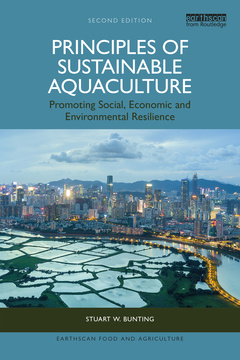Description
Principles of Sustainable Aquaculture (2nd Ed.)
Promoting Social, Economic and Environmental Resilience
Earthscan Food and Agriculture Series
Author: Bunting Stuart W.
Language: English
Subjects for Principles of Sustainable Aquaculture:
Keywords
development; east; kolkata; wetlands; wastewater; systems; production; shellfi; meal; integrated
Publication date: 03-2024
· 15.6x23.4 cm · Paperback
Publication date: 03-2024
· 15.6x23.4 cm · Hardback
Description
/li>Contents
/li>Readership
/li>Biography
/li>
This book provides an introduction to sustainable aquaculture practices, focusing on how we develop social, economic and environmental resilience.
Aquaculture has seen phenomenal worldwide growth in the past 50 years, and many people view it as the best solution for the provision of high-quality protein to feed the world's growing population. This new edition has been fully revised and updated to reflect new developments in the field and includes new case studies. Focusing on developing more sustainable aquaculture practices and aquatic food systems, the book provides a toolbox of approaches to support widespread adoption and appropriate adaptation of regenerating aquaculture strategies, ensuring that it has practical relevance for both students and professionals. Drawing on a range of case studies from around the world, the book shows where progress, in terms of developing ecologically sound and socially responsible forms of aquaculture, has been made. The book is based on extensive evidence and knowledge of best practices, with guidance on appropriate adaptation and uptake in a variety of environmental, geographic, socio-economic and political settings. Concentrating on low-impact aquaculture systems and approaches, which have minimal adverse effects on the environment, the book also emphasizes socially responsible and equitable aquaculture development to enhance the natural resource base and livelihoods.
Principles of Sustainable Aquaculture is essential reading for students and scholars of aquaculture, fisheries, marine and water resource governance, and sustainable agriculture and sustainable food systems more broadly. It will also be of interest to professionals working in the aquaculture and fisheries industries.
1 Introduction
2 Resource-conserving and agroecosystem-enhancing aquaculture
3 Equitable aquaculture development
4 Sustainable coastal and marine aquaculture
5 Sustainable rural aquaculture
6 Sustainable urban and peri-urban aquaculture
7 Enhancing prospects for sustainable aquaculture development
8 Promoting an enabling environment
Stuart W. Bunting, PhD, is an independent researcher, consultant and author who has over 25 years of experience in the fields of aquaculture, food systems, agriculture, biodiversity conservation and fisheries management. He has worked on projects across the globe and undertaken assignments sponsored by international organisations, such as WorldFish, the FAO, the Global Innovation Fund, Asian Development Bank, European Commission, The Crown Estate and the UK Government. He sits on the editorial boards of Frontiers in Aquaculture, Frontiers in Sustainable Food Systems and the International Journal of Agricultural Sustainability.




